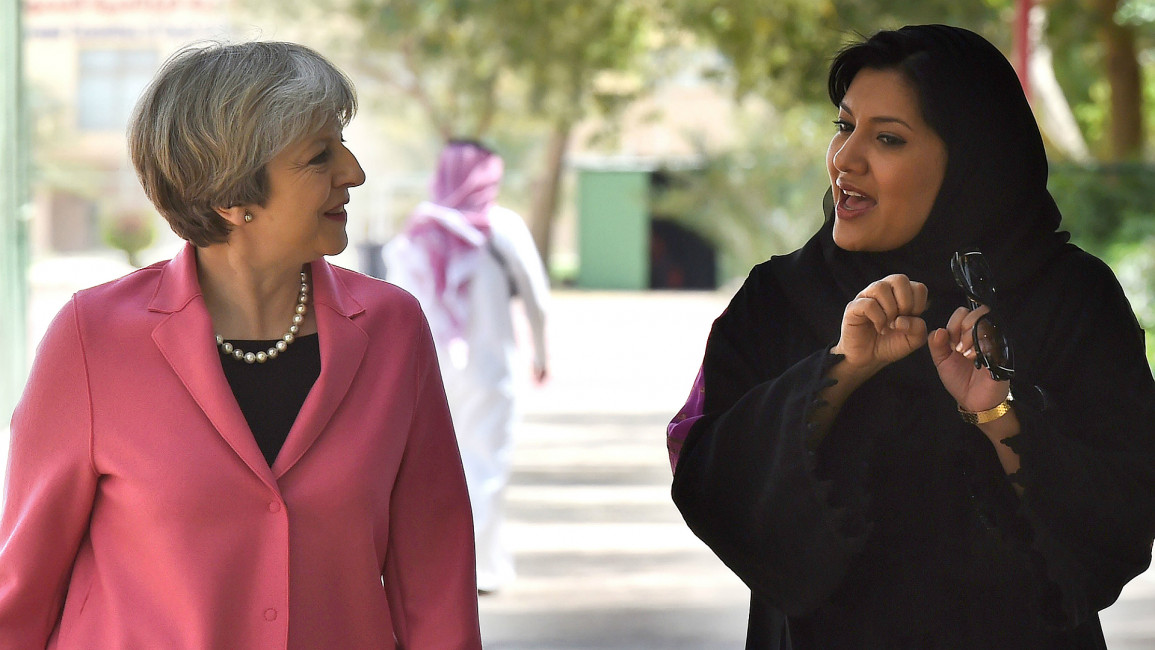
May's refusal to wear a hijab is not feminism
British Prime Minister Theresa May was recently hailed in the UK media for going against her Foreign Office recommendations and refusing to wear a headscarf on her diplomatic trip to Saudi Arabia.
According to Foreign Office guidelines: Women should wear conservative, loose-fitting clothes as well as a full length cloak (abaya) and a headscarf.
British media outlets even sunk to the extent of comparing May's attire - a navy trouser suit - with Britain's first and only other female prime minister, Margaret Thatcher, who wore a loose-fitted long dress and covered most of her hair when she visited the conservative kingdom.
The implication was that May is somewhat more of a feminist than Thatcher, who once remarked "I owe nothing to women's lib[eration movement]".
Many problematic insinuations rise from this.
First, it is not recommended anywhere by the Saudi Ministry of Foreign Affairs that female world leaders on official visits must wear a hijab or an abaya.
 |
It is not recommended anywhere by the Saudi Ministry of Foreign Affairs that female world leaders on official visits must wear a hijab or an abaya |  |
May is not the first, nor will she be the last, Western female politician to refuse to adhere to traditional dress codes when visiting the kingdom.
 |
|
| Special coverage: More than 150 features, blogs, and opinion articles from inside the real fight for women's rights in the Middle East |
Peddling the narrative that the Saudi government is forcing Western politicians to adhere to its cultural dress codes shows Western media once again acting erroneously and irresponsibly.
While May is being portrayed as the unsung hero of the feminist movement at home for defying her own government's inaccurate guidelines, the truth of the matter is that she hasn't actually received any kind of backlash from either Saudi politicians, or criticism among Saudi civil society for not wearing a hijab.
May arrived and was able to conduct her affairs normally, with her attire posing no barrier in serving the British nation's "economic interests".
 |
Theresa May hasn't actually received any kind of backlash from either Saudi politicians, or criticism among civil society for not wearing a hijab... She arrived and was able to conduct her affairs normally |  |
It is also unnecessary to even commend the UK leader for making a "pro-women statement" through her attire.
May's presence in the Gulf kingdom was for the purpose of furthering her project increasing international trade deals after Britain leaves the EU.
To assume that she was making a feminist statement because she arrived as a visibly Western feminine entity is not only patronising to May, but reflects an exasperating Eurocentricity.
The thought of a Western female politician making a political statement by either adhering to or defying cultural attire when venturing on diplomatic visits undermines many voices of local feminists in the region.
| Read more: Hijabs, white supremacy and Swedish-Iranian economic deals |
It must also be remembered that May had absolutely no intention on pressing for women's emancipation in Saudi Arabia.
If anything, May's insistence on expanded trade with Saudi Arabia has been consistently condemned by human rights organisations in the UK. Before May arrived, the deputy director of Reprieve, Harriet McCulloch, warned May that her "desire for closer relations with the Gulf must not cloud Britain's commitment to human rights".
On the same day she held talks with Saudi officials, a campaign advocating Saudi women's liberation was shut down after it was subject to widespread hostility.
The Saudi-funded TV channel MBC4 had launched a social media campaign which aimed to promote women's rights.
But the campaign angered many Saudis, who believed they were inciting women to abandon their religious values and cultural traditions.
Thousands of Twitter users called for a boycott of the channel, and a Saudi prince, who helped establish the network, condemned the campaign and even called for the "destruction" of the employees behind it.
 |
May's insistence on expanded trade with Saudi Arabia has been consistently condemned by human rights organisations in the UK |  |
Despite being a woman, in her unstinting prioritisation of trade deals over human rights, May refused to comment on the issue - or any other issues that affect both Saudi and expat women in the country.
This further proves inconsistencies in the way in which the mainstream British media reported May's visit.
Theresa May's tour to Saudi Arabia has defied no boundaries, riled no misogynists or even challenged any conventional norms in any way that may have been of assistance to women here.
She was misinformed by the FCO - and the unjust media praise she has received is a gross perversion of the feminist school of thought.
The tendency to brand a woman in power as "feminist" is one that misrepresents much of the feminist movement. Women must be defined as feminists only based on their own feminist credentials, and their competence in the feminist movement must be measured by their intersectionality and ability to respect the many ways women across the world conduct their own liberation movements.
Follow Diana Alghoul on Twitter: @SuperKnafeh
Opinions expressed in this article remain those of the author and do not necessarily represent those of The New Arab, its editorial board or staff.




